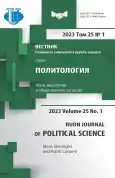Pan-Slavism of F.I. Tyutchev and F.M. Dostoevsky: Historical and Political Analysis
- 作者: Myrikova A.V.1, Prokudin B.A.1
-
隶属关系:
- Lomonosov Moscow State University
- 期: 卷 25, 编号 1 (2023): Ideas, Ideologies and Public Consent
- 页面: 38-48
- 栏目: FROM THE HISTORY OF SOCIO-POLITICAL THOUGHT
- URL: https://journal-vniispk.ru/2313-1438/article/view/322242
- DOI: https://doi.org/10.22363/2313-1438-2023-25-1-38-48
- ID: 322242
如何引用文章
全文:
详细
The ideas of Slavic unity periodically played a significant role in politics. Today, the ideas of pan-Slavism, both political and cultural, are relevant again. The objective of this study is to identify two stable trends of pan-Slavism of the 19th century, “political” and “cultural”, which are reflected in the works of classics of Russian literature: F.I. Tyutchev and F.M. Dostoevsky. The history of socio-political doctrines as an interdisciplinary field of knowledge involves the study of various sources, including fiction. The theoretical basis of this research is a political and textual approach to the study of texts developed at the Department of the History of Socio-Political Doctrines of the Faculty of Political Science of Lomonosov Moscow State University, as well as methods used in the research of political science fiction. According to the results of the study, it can be concluded that ideologically Tyutchev was close to representatives of “political” pan-Slavism. He believed that the “Germanization” and “Turkification” of the Slavic peoples jeopardized the state interests of Russia and called for actions to liberate, unite and Russify the Slavic countries (the idea of the Slavic Empire). Dostoevsky gravitated towards “cultural” pan-Slavism. He did not deny the very possibility of such a union, but believed that first it was necessary to raise the level of civic culture, for Dostoevsky the future of the “Slavic cause” was determined by the Orthodox-Messianic idea. If Russia aims to build allied relations with Slavic countries, it will have to formulate an attractive idea that could also contribute to the spiritual unification of Slavs and other peoples.
作者简介
Anna Myrikova
Lomonosov Moscow State University
编辑信件的主要联系方式.
Email: an_my@mail.ru
ORCID iD: 0000-0003-2028-1770
PhD in Political Science, Associate Professor, Department of the History of Public and Political Doctrines, Faculty of Political Science
Moscow, Russian FederationBoris Prokudin
Lomonosov Moscow State University
Email: probor@bk.ru
ORCID iD: 0000-0002-6590-6706
PhD in Political Science, Associate Professor, Department of the History of Public and Political Doctrines, Faculty of Political Science
Moscow, Russian Federation参考
- Boldin, V.A. (2018). Pan-Slavist political concepts: genesis and evolution. Moscow: Aquilo. (In Russian).
- Boldin, V.A., & Prokudin, B.A. (2019) Еvolution of the Pan-Slavist Views of V.I. Lamansky at the Beginning of the 20th Century. The Caspian Region: Politics, Economics, Culture, 3, 158-167. (In Russian).
- Egorov, B.F. (2003). On the nationalism and pan-Slavism of the Slavophils. In Egorov B.F. From Khomyakov to Lotman. Moscow: LRC Publishing House. (In Russian).
- Gilazov, M.V. (2002). Political ideas and projects of R.A. Fadeev (1824-1884). Moscow: Sotsial’nopoliticheskaya mysl’. (In Russian).
- Jong, H.-S. (1997). Idea of Slavic unity in the worldview of F.I. Tyutchev. In Slavic question: Milestones of history (pp. 55-69). Moscow: Institute of Slavic and Balkan studies of the Russian Academy of Sciences. (In Russian).
- Justin, (Popovich) Pr. (2002). Dostoevsky about Europe and the Slavs. Mocow-St. Peterburg: Sretenskiy monastyr’. (In Russian).
- Lazari, A. (2004). In the circle of Dostoevsky. Pochvennichestvo. Moscow: Nauka. (In Russian).
- Levine, L. (1914). Pan-Slavism and European Politics. Political Science Quarterly, 29(4), 664-685.
- Maxwell, A. (2011). Herder, Kollár, and the Origins of Slavic Ethnography. Traditiones. № 40 (2), 79-95 http://doi.org/10.3986/Traditio2011400205
- Nenasheva, Z.S. (1992). Slavic societies in Russia in the last four years. In Lapteva, L.P. (Ed.), Balkan studies. Vol. 16. Russian society and foreign Slavs. XVIII - early XX century (pp. 33-44). Moscow: Institute of Slavic Studies and Balkanistics of the Russian Academy of Sciences (In Russian).
- Prokudin, B.A. (2016). V.I. Lamansky about the unity of the Slavs. Bulletin of the Russian Nation, 3, 70-83. (In Russian).
- Shirinyants, A.A., & Myrikova, A.V. (2010). The Russophobic myth of “Pan-Slavism”. Political Studies. Bulgarian Association for political science, 1-2, 61-83.
- Shirinyants, A.A., & Myrikova, A.V. (2020). Russian socio-political thought: F.I. Tyutchev. Moscow: Sotsial’no-politicheskaya mysl’. (In Russian).
补充文件









